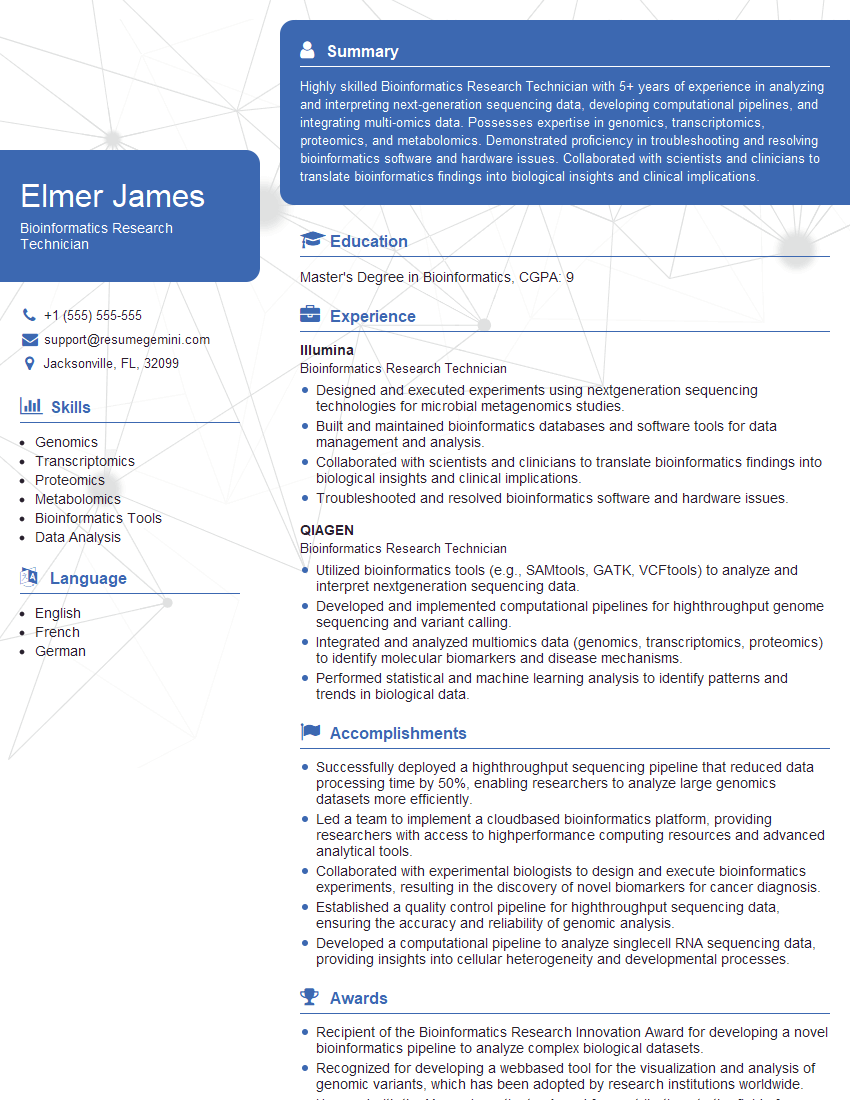Are you a seasoned Bioinformatics Research Technician seeking a new career path? Discover our professionally built Bioinformatics Research Technician Resume Template. This time-saving tool provides a solid foundation for your job search. Simply click “Edit Resume” to customize it with your unique experiences and achievements. Customize fonts and colors to match your personal style and increase your chances of landing your dream job. Explore more Resume Templates for additional options.

Elmer James
Bioinformatics Research Technician
Summary
Highly skilled Bioinformatics Research Technician with 5+ years of experience in analyzing and interpreting next-generation sequencing data, developing computational pipelines, and integrating multi-omics data. Possesses expertise in genomics, transcriptomics, proteomics, and metabolomics. Demonstrated proficiency in troubleshooting and resolving bioinformatics software and hardware issues. Collaborated with scientists and clinicians to translate bioinformatics findings into biological insights and clinical implications.
Education
Master’s Degree in Bioinformatics
September 2018
Skills
- Genomics
- Transcriptomics
- Proteomics
- Metabolomics
- Bioinformatics Tools
- Data Analysis
Work Experience
Bioinformatics Research Technician
- Designed and executed experiments using nextgeneration sequencing technologies for microbial metagenomics studies.
- Built and maintained bioinformatics databases and software tools for data management and analysis.
- Collaborated with scientists and clinicians to translate bioinformatics findings into biological insights and clinical implications.
- Troubleshooted and resolved bioinformatics software and hardware issues.
Bioinformatics Research Technician
- Utilized bioinformatics tools (e.g., SAMtools, GATK, VCFtools) to analyze and interpret nextgeneration sequencing data.
- Developed and implemented computational pipelines for highthroughput genome sequencing and variant calling.
- Integrated and analyzed multiomics data (genomics, transcriptomics, proteomics) to identify molecular biomarkers and disease mechanisms.
- Performed statistical and machine learning analysis to identify patterns and trends in biological data.
Accomplishments
- Successfully deployed a highthroughput sequencing pipeline that reduced data processing time by 50%, enabling researchers to analyze large genomics datasets more efficiently.
- Led a team to implement a cloudbased bioinformatics platform, providing researchers with access to highperformance computing resources and advanced analytical tools.
- Collaborated with experimental biologists to design and execute bioinformatics experiments, resulting in the discovery of novel biomarkers for cancer diagnosis.
- Established a quality control pipeline for highthroughput sequencing data, ensuring the accuracy and reliability of genomic analysis.
- Developed a computational pipeline to analyze singlecell RNA sequencing data, providing insights into cellular heterogeneity and developmental processes.
Awards
- Recipient of the Bioinformatics Research Innovation Award for developing a novel bioinformatics pipeline to analyze complex biological datasets.
- Recognized for developing a webbased tool for the visualization and analysis of genomic variants, which has been adopted by research institutions worldwide.
- Honored with the Young Investigator Award for contributions to the field of bioinformatics, including the development of novel algorithms for genome assembly.
- Recognized for developing a machine learning algorithm that accurately predicts the pathogenicity of genetic variants, contributing to precision medicine.
Certificates
- Certified Bioinformatics Scientist (CBS)
- Certified Genome Analyst (CGA)
- Amazon Web Services (AWS) Certified Solutions Architect
- Google Cloud Certified Professional Data Engineer
Career Expert Tips:
- Select the ideal resume template to showcase your professional experience effectively.
- Master the art of resume writing to highlight your unique qualifications and achievements.
- Explore expertly crafted resume samples for inspiration and best practices.
- Build your best resume for free this new year with ResumeGemini. Enjoy exclusive discounts on ATS optimized resume templates.
How To Write Resume For Bioinformatics Research Technician
- Highlight your expertise in bioinformatics tools and techniques, such as NGS data analysis, genome assembly, transcriptome analysis, and proteomics data interpretation.
- Showcase your ability to integrate and analyze multi-omics data to identify molecular biomarkers and disease mechanisms
- Demonstrate your experience in developing and implementing computational pipelines for high-throughput data analysis.
- Emphasize your collaborative skills and ability to translate bioinformatics findings into actionable insights for scientific research and clinical applications.
Essential Experience Highlights for a Strong Bioinformatics Research Technician Resume
- Utilized bioinformatics tools (e.g., SAMtools, GATK, VCFtools) to analyze and interpret next-generation sequencing data
- Developed and implemented computational pipelines for high-throughput genome sequencing and variant calling
- Integrated and analyzed multi-omics data (genomics, transcriptomics, proteomics) to identify molecular biomarkers and disease mechanisms
- Performed statistical and machine learning analysis to identify patterns and trends in biological data
- Designed and executed experiments using next-generation sequencing technologies for microbial metagenomics studies
- Built and maintained bioinformatics databases and software tools for data management and analysis
- Collaborated with scientists and clinicians to translate bioinformatics findings into biological insights and clinical implications
Frequently Asked Questions (FAQ’s) For Bioinformatics Research Technician
What is the role of a Bioinformatics Research Technician?
A Bioinformatics Research Technician utilizes bioinformatics tools and techniques to analyze and interpret biological data, develop computational pipelines, and integrate multi-omics data to identify molecular biomarkers and disease mechanisms.
What are the key skills required for a Bioinformatics Research Technician?
Key skills include proficiency in bioinformatics tools, data analysis, genomics, transcriptomics, proteomics, and statistical and machine learning analysis.
What are the career prospects for a Bioinformatics Research Technician?
Bioinformatics Research Technicians are in high demand in the pharmaceutical, biotechnology, and healthcare industries, where they play a crucial role in advancing biomedical research and developing personalized medicine approaches.
What is the average salary for a Bioinformatics Research Technician?
The average salary for a Bioinformatics Research Technician varies depending on experience, location, and industry, but typically ranges from $60,000 to $90,000 per year.
What are the educational requirements for a Bioinformatics Research Technician?
A Master’s degree in Bioinformatics or a related field is typically required, along with strong computational and analytical skills.
What are the top companies hiring Bioinformatics Research Technicians?
Top companies hiring Bioinformatics Research Technicians include Illumina, QIAGEN, Thermo Fisher Scientific, and Gilead Sciences.
How can I improve my chances of getting hired as a Bioinformatics Research Technician?
To improve your chances of getting hired, highlight your expertise in bioinformatics tools and techniques, showcase your ability to integrate and analyze multi-omics data, and demonstrate your collaborative skills and ability to translate bioinformatics findings into actionable insights.